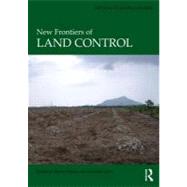- ISBN: 9780415529907 | 0415529905
- Cover: Hardcover
- Copyright: 8/29/2012
Land questions have invigorated agrarian studies and economic history, with particular emphases on its control, since inspiring nineteenth century thinkers. Words such as 'exclusion', 'alienation', 'expropriation', 'dispossession', and 'violence' describe processes that animate land histories and those of resources, property rights, and territories established, extracted, produced, or protected on land. Primitive and on-going forms of accumulation, frontiers, enclosures, territories, grabs, and racializations have long been associated with mechanisms for land control. More recently, agrarian environments have been transformed by processes of de-agrarianization, protected area establishment, urbanization, migration, land reform, resettlement, and re-peasantization. Even the classic agrarian question of how the social relations of agriculture will be influenced by capitalism has been reformulated multiple times at transformative conjunctures in the historical trajectories of these processes, reviving and producing new debates around the importance of land control. The 10 authors in this volume focus primarily on new frontiers of land control and their active creation. These frontiers are sites where authorities, sovereignties, rights, and hegemonies of the recent past have been challenged by new enclosures, property regimes, and territorializations, producingnew dynamics between urban, agrarian, and 'natured' environments. Contributors examine labor and production processes engaged by new configurations of actors, new sorts of agrarian and environmental subjects and the networks connecting them, and new legal and violent means of challenging established or imminent land controls. Some cases augment analytic tools that had seemed to have timeless applicability with new frameworks, concepts, and theoretical concepts. What difference does land control make? These contributions to the debates demonstrate that the answers have been shaped by conflicts, contexts, histories, and agency. Land control still matters, and will apparently continue to inspire struggles for a long time. This book was originally published as a special issue of the Journal of Peasant Studies.






